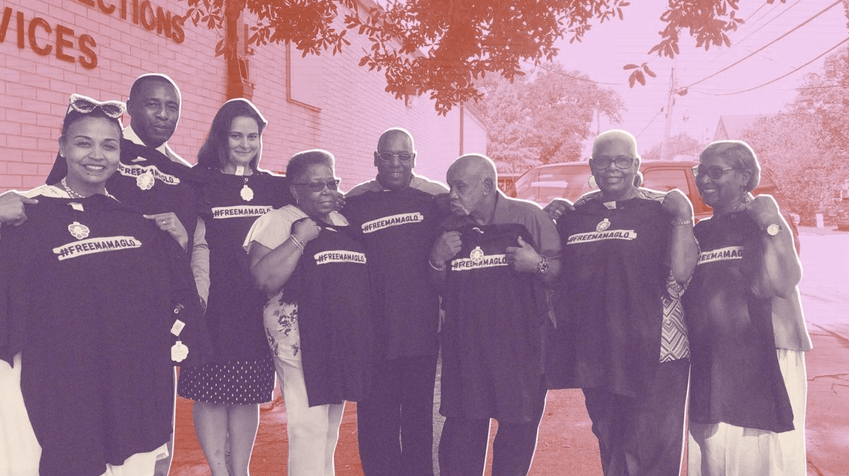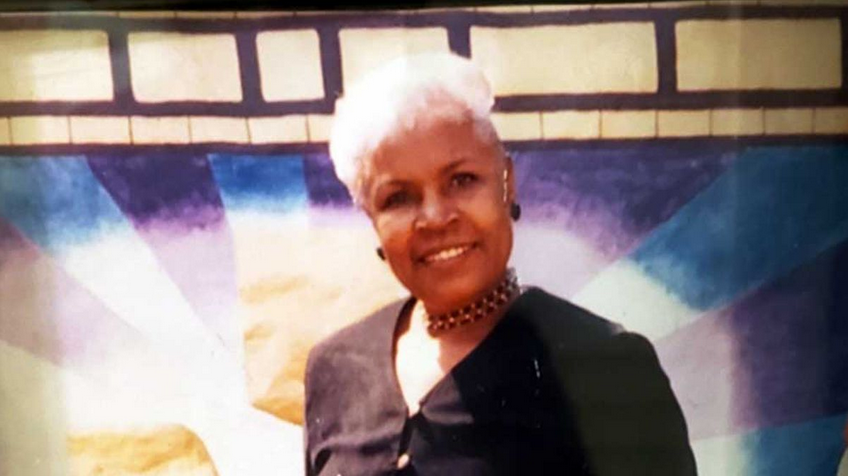
LIFE FOR ATTEMPTING TO ROB GROCERY STORE WITH TOY GUN SEEKS MERCY
Louisiana Woman Sentenced To Life For Attempting To Rob Grocery Store With Toy Gun Seeks Mercy

Gloria Williams turns 74 this month. She has spent nearly 50 birthdays behind bars and is the longest-serving female prisoner in Louisiana.
But on July 22, the Louisiana Board of Pardons and Parole gave her a favorable recommendation for commutation, which would shorten her life without parole sentence. If Governor John Bel Edwards agrees with the recommendation, Williams will become eligible for parole, which may allow her to spend her birthday with her children, grandchildren, great-grandchildren, and siblings.
Nearly 2.3 million people are incarcerated in the U.S., and clemency is a tool governors can use to provide relief to people who have served long prison sentences. It can also help roll back mass incarceration. Until 2016, Louisiana had the nation’s highest rate of incarceration—Oklahoma now holds that dubious distinction—and since taking office in 2016, Edwards has overhauled the state’s criminal legal system. In June 2017, Edwards signed into law a package of 10 bills intended to reform some of the state’s most punitive laws such as the habitual offender statute. Under one of the bills, mandatory minimum sentences for second and third offenses were shortened and judges were permitted to depart from constitutionally excessive sentences. On July 19, Edwards’s office announced that the state’s prison population fell from 39,867 in 2012 to 32,397 in 2018.
By 1971, Gloria Williams was a 25-year-old remarried mother of five living in Houston. She had married the first time a decade earlier at age 14. After she and her husband separated, he took custody of their two eldest children and placed them in the care of his father and stepmother. With a fifth-grade education and little money, she struggled to fight her custody case.
Following an attorney’s advice, she married the man she was dating, W.C. Williams, in order to present a more stable family appearance to the courts. But instead of getting custody of her children, she says W.C. Williams injected her with heroin and physically abused her, including shooting her in the hand and pointing a gun at her children.
When Williams attempted to leave him, she was kidnapped and beaten by a man she did not know, but she believed acted on her husband’s orders. Williams says the terror did not stop even after her husband was arrested and imprisoned for armed robbery in 1970. She says that through a friend, he told her to find money for an attorney to represent him in his case and warned that if she didn’t follow his orders there would be consequences.
(The Appeal was unable to locate W.C. Williams for comment. An attorney for Gloria Williams told The Appeal that they are also uncertain of his whereabouts but identified a man matching his description who died in 2004.)
In February 1971, Williams drove to Louisiana with two other people. They spent a night in Opelousas, a south Louisiana town of approximately 16,000 people, where Williams had previous lived. They decided to rob a grocery store using Williams’ son’s toy gun. But after they entered the store, their plans went awry. The store’s owner, Budge Cutrera, was armed. After a struggle, Williams’s 16-year-old co-defendant shot and killed Cutrera with his own gun. The three were arrested and, nine months later, sentenced in a St. Landry Parish courtroom to life without parole.
During her first three years at the Louisiana Correctional Institute for Women (LCIW), Williams refused to accept that she would spend the rest of her life in prison and made three escape attempts. In 1973, Williams made it to Houston, where she was arrested for armed robbery. Williams was then sentenced to eight years in a Texas prison, where she obtained her GED and cosmetology license. In 1982, she was returned to LCIW where she continued to serve her life without parole sentence. In 1985, she attempted to escape from LCIW a fourth time but was apprehended and then placed in solitary confinement for the next 10 years. The use of long-term solitary confinement in Louisiana was widespread in the 1970s and 1980s; Black Panther Albert Woodfox endured a 43-year stretch in solitary that began in 1972.
In 1995, one of the prison’s deputy wardens advocated for her release from solitary. Williams was then returned to the general population, where she became involved with the prison ministry and Big Sisters, a mentoring program pairing newcomers to prison with women who are veterans of the system. She also was a longtime member of the prison’s drama club.
Despite a sentence that promised death by incarceration, Williams participated in rehabilitative programs such as anger management and a substance use recovery program.
Williams counseled and mentored younger women, earning her the nickname “Mama Glo.” Her commutation packet includes 43 certificates from 17 programs as well as recommendations from prison administrators, program volunteers, and women she has mentored. “I’ve watched Ms. Gloria help so many young and older troubled woman [sic] from the wisdom she has gained over the years,” wrote one woman who has been incarcerated since the age of 17.
Now, Williams is hoping for a chance to put these skills to use outside the prison walls.
In his first six months in office, Governor Edwards granted 22 commutations. He put down his commutation pen in 2017, but picked it up again last year. In June 2018, he commuted the sentence of Rob Rich, who served 21 years of a 60-year prison sentence for robbery. In September 2018, Rich walked out of the Louisiana State Penitentiary and reunited with his wife, Fox, and their five children.
In April, the couple co-founded Participatory Defense Movement-NOLA to train family members with incarcerated loved ones to fight their cases and advocate for criminal legal system reform. When the couple learned that Williams filed a clemency petition, they became interested in helping her. Fox Rich had met Williams briefly while she herself was incarcerated in her husband’s robbery case (the pair were co-defendants). Rich was also moved by the fact that Williams left behind five children whom she might never be able to parent without prison walls between them. “We thought it would be an amazing opportunity to give to another family,” she told The Appeal. Fox and Rob Rich then reached out to the Promise of Justice Initiative, a New Orleans-based criminal justice policy and advocacy nonprofit, which assigned attorney Amanda Zarrow to represent Williams.
In Louisiana, pardon hearings occur in two separate locations. The five-person board meets at the Department of Corrections headquarters in Baton Rouge. Applicants are brought to the Louisiana Correctional Institute for Women, which has since been moved to the former Jetson Center for Youth in Baker after its original location was flooded in 2016. At LCIW, applicants appear by video call at the Baton Rouge hearing.
Thirty members of Williams’s family drove from Texas and Louisiana to support her Board of Pardons and Parole hearing at LCIW on July 22. Some family members, such as Williams’s grandniece, grandchildren, and great-grandchildren, only knew her through letters and family stories; that day, they hugged her for the first time. Via video, Williams’s son and sister told the pardon board about her importance in their lives and what it would mean, 48 years after she was first incarcerated, for her to come home. “There wasn’t a dry eye in the room,” Zarrow said, adding that board members commented several times about the outpouring of family support they saw through their video screen.
No one appeared at the hearing to oppose Williams’s commutation, though according to board members, one of Cutrera’s sons, as well as law enforcement and prosecutors in Opelousas, are against any clemency in her case.
Of the three women who appeared before the pardon board that day, only Williams received a favorable recommendation.
That’s not unusual, Rob Rich told The Appeal. In 2018, the pardon board received 167 clemency applications and only gave a favorable recommendation to 70, which were then sent to Edwards for approval. When Rob Rich appeared before the pardon board on May 14, 2018, commissioners also considered six other applications. But Rich was the only person whose sentence was commuted. And he was not automatically released from prison. Instead, the board recommended that Rich become parole-eligible immediately. Governor Edwards agreed and in June 2018 signed Rich’s commutation. On Sept. 13, Rich appeared before the parole board. On Sept. 20, he walked out of prison, but he will be on parole for the next 40 years.
If Rich hadn’t received a commutation, he would not have become eligible for parole until he had served 85 percent of his sentence (or 51 years). That’s why he, his wife, Williams’s family, and advocates for criminal legal reform are pushing for Edwards to approve a commutation for Williams. The board’s recommendation is now pending before Edwards. His press office did not respond to multiple requests for comment from The Appeal.
Williams is the only person still imprisoned for Cutrera’s death nearly 50 years ago.
The woman who shot Cutrera died 15 years ago in prison. The third participant in the crime, Philip Anthony Harris, was granted a commutation in 1987.
Zarrow said Williams has “created purpose in her life by … using her experience to mentor and guide those other women. “
“At 73 years old, she’s really deserving of an opportunity to go home and be a mother to her children [and] to her grandchildren,” Zarrow continued. “If we view rehabilitation as one of the aims of our criminal justice system, when someone has really and truly been rehabilitated, we should recognize and honor that.”
Correction: An earlier version of this article stated that Williams was living in Opelousas at the time of the grocery store robbery. She was living in Houston, not Opelousas.

About us
Participatory Defense Movement is a community organizing model for people facing charges, their families, and communities to impact the outcome of cases and transform the landscape of power in the court system in an effort to reduce harm.
We meet every Thursday at 6pm CST. Join our hub!
Useful Links
Contact info
info@pdmnola.org
Mailing:
PO Box 56552
New Orleans, 70156
Join the movement!
Contact Us
Thank you for taking the first step to join the movement.
We will get back to you as soon as possible
Please try again later

